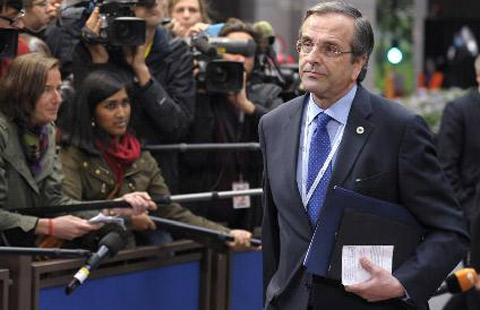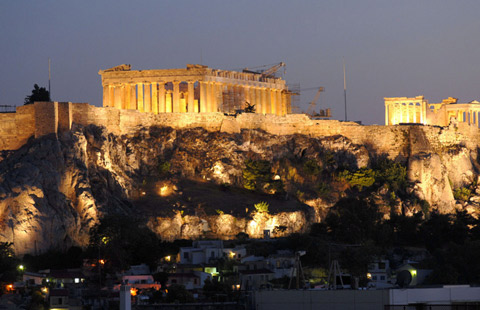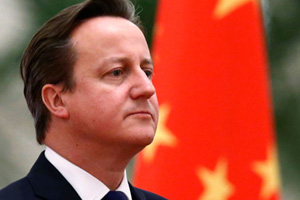
China-British relations
Comments Print Mail Large Medium SmallComprehensive and flourishing development period
When the Labor Party came into power in 1997, Prime Minister Tony Blair decided to mark the transfer of government in Hong Kong as a new start to improve and develop comprehensive Sino-British relations. The ceremony for the transfer of government was launched on June 30 the same year. Ever since then, the bilateral relations have entered a new era of comprehensive development.
--In 1998, Premier Zhu Rongji and Prime Minister Tony Blair of the UK exchanged successful visits, and the two countries issued the Joint Statement, announcing the establishment of the comprehensive partnership.
--In October 1999, at the invitation of Her Majesty Queen Elizabeth II, President Jiang Zemin paid a state visit to the UK, the first visit of its kind in the history of the countries' bilateral relations by China's head of state. The visit turned out to be a great success, and laid a significant foundation for the development of Sino-British relations in the new century.
--In August 2000, Chairman of the Standing Committee of the National People's Congress Li Peng met with the UK's Speaker of the House of Commons Betty Boothroyd in New York at the Millennium Conference of Presiding Officer of National Parliaments.
--In October 2001, at the invitation of Prime Minister Blair, Vice President Hu Jintao paid an official visit to the UK.
--In May 2002, Chairman of the Chinese People's Political Consultative Conference Li Ruihuan visited the UK at the invitation of Lord Irvine, the Lord Chancellor.
All these high level contacts gave further impetus to the development of bilateral relations.
At present, close contacts and frequent exchange of visits at a high level are maintained between the two countries and there is dynamic exchange and cooperation at all levels in the fields of politics, trade, economy, culture, and the military.
--In September 2002, Premier Zhu Rongji held a bilateral meeting with Prime Minister Tony Blair when attending the World Summit on Sustainable Development in South Africa.
--In 2003, the two sides respectively set up bilateral relations interaction groups to further enhance bilateral relations and deepen cooperation in various fields.
--In May 2004, Premier Wen Jiabao paid an official visit to the UK. The two sides issued a joint statement to announce the establishment of the comprehensive strategic partnership between China and the UK. The statement also said the countries agreed to establish a mechanism for an annual meeting between the Premier and Prime Minister and to identify priority fields of cooperation between the two nations.
--In July 2005, President Hu Jintao attended the G8 outreach session in the UK. In September, Prime Minister Tony Blair paid a visit to China, and the two countries decided to establish a strategic dialogue mechanism. In November, President Hu Jintao paid a state visit to the UK at the invitation of Queen Elizabeth II.
--In September 2006, Premier Wen Jiabao paid a working visit to the UK. In October, Jia Qinglin, chairman of Chinese People's Political Consultative Conference, paid an official goodwill visit to the UK.
--In December 2007, Foreign Minister Yang Jiechi visited the UK.
--In January 2008, Prime Minister Gordon Brown paid his first official visit to China. In August of the same year, Brown attended the closing ceremony of the Beijing Olympic Games.
--In January 2009, Premier Wen Jiabao paid an official visit to the UK, during which the two sides issued the Joint Statement between the People's Republic of China and the United Kingdom of Great Britain and Northern Ireland on strengthening cooperation, and actively dealing with the international financial crisis. They also signed seven agreements covering various fields such as trade, energy and culture. The British Government issued its first China strategy paper, "The UK and China: A Framework for Engagement", which listed China as "a major priority" in the UK's future foreign policy.
In April, President Hu Jintao attended the Second Financial Summit of G20 Leaders in London and met with Prime Minister Gordon Brown and Prince Charles, reaching extensive consensus on the international financial crisis, the promotion of the reform in the international financial system and the development of China-UK relations.
In May, Vice Premier Wang Qishan paid an official visit to the UK and presided over the Second China-UK Economic and Financial Dialogue. The two sides conducted in-depth discussions on financial issues of mutual concern that have overarching, strategic and long-term impacts and reached consensus on more than 20 agreements.
In October, State Councillor Dai Bingguo paid a visit to Britain and met with Prime Minister Brown, the head of UK's China Relations Group and Chancellor of the Exchequer Alistair Darling, Foreign Secretary David Miliband and Conservative Party leader David Cameron.
--In January 2010, when attending the International Conference on Afghanistan in London, Foreign Minister Yang Jiechi held a bilateral meeting with British Foreign Secretary David Miliband, and both sides stressed the need to ensure that bilateral relations develop along the right track.
In March, British Foreign Secretary David Miliband paid a visit to China and met with Premier Wen Jiabao. The two sides agreed to upgrade the China-UK strategic dialogue. State Councilor Dai Bingguo chaired the new round of strategic dialogue with Miliband and Foreign Minister Yang Jiechi held a meeting with him.
In April, Queen Elizabeth II sent a letter of condolence to President Hu Jintao following the deadly earthquake in Yushu, Qinghai.
In June, President Hu Jintao met with British Prime Minister David Cameron at the G20 Toronto Summit. The two sides agreed to further deepen relations between the two countries and expand China-UK cooperation in bilateral and international affairs.
In the same month, Vice Premier Wang Qishan met with British Chancellor of the Exchequer George Osborne, who was on a visit to China before attending the G20 Finance Ministers and Central Bank Governors' Meeting in the ROK.
In July, Foreign Secretary William Hague visited China and Premier Wen Jiabao met with him. State Councilor Dai Bingguo co-chaired the China-UK Strategic Dialogue with Secretary Hague and Foreign Minister Yang Jiechi held a meeting with him. Secretary Hague expressed the UK's hope to further deepen the UK-China partnership, to strengthen cooperation in various fields and to expand common interests. He also proposed the establishment of a "partnership for growth" between China and the UK. Hague reiterated that the new British government will continue to pursue the policy of the previous government on Taiwan and Tibet and recognize Tibet as part of the Chinese territory.
In September, Prince Andrew, British special representative for international trade and investment, attended the British Pavilion Day events at the Shanghai World Expo and was met by Vice Premier Wang Qishan.
In recent years, the UK has attached greater importance to advancing relations with China and has seen the rise of China from a pragmatic perspective; it works for deeper cooperation with China and hopes to see China play a greater role in international affairs.
The two countries have maintained frequent high-level exchanges and contacts, and have established the prime ministerial-level annual meeting, the economic and financial dialogue, the bilateral relations interaction groups, the strategic dialogue and the mechanisms for consultation and dialogue on strategic security, foreign policy, human rights and arms control.
However, among all these flourishing moments, some problems are still impeding the development of China-British relations. Despite China's repeated objections, Gordon Brown's meeting with the Dalai Lama in 2008 and David Cameron's in 2012 greatly damaged bilateral relations and hurt the Chinese people's feelings.
China-British relations are also affected by US foreign policies. There are very few direct conflicts between China and the UK, but the UK's "special relationship" with the US since World War II regarding foreign policy means that sometimes China-UK relations are affected by China-US relations.




